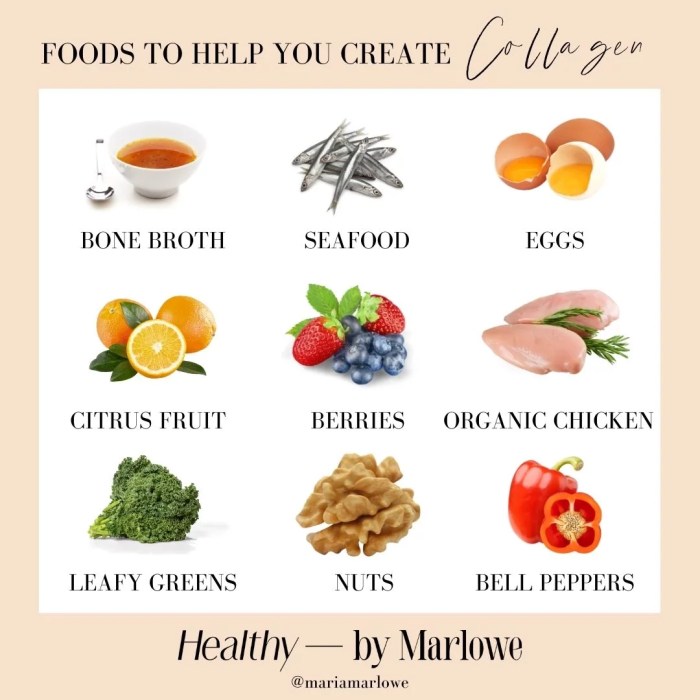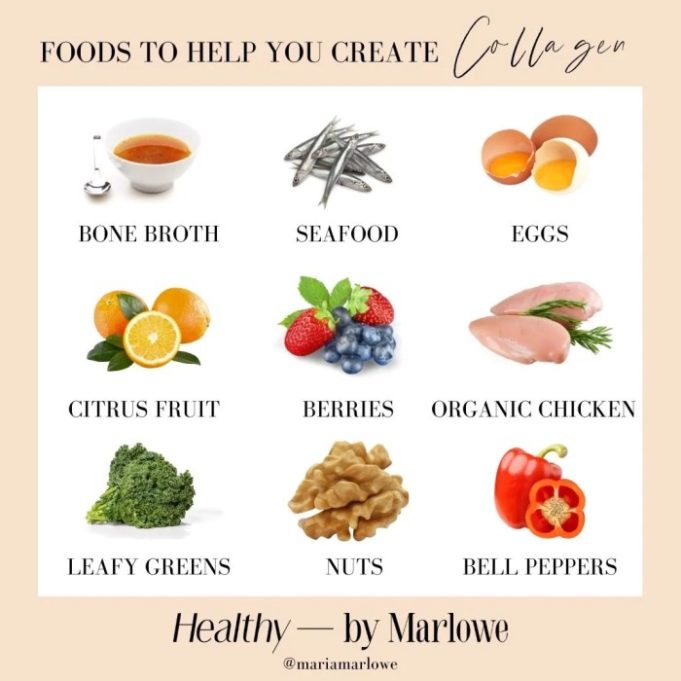How to get collagen in your diet is a question that many people are asking. Collagen is a protein that is essential for the health of our skin, bones, joints, and other tissues. As we age, our bodies naturally produce less collagen, which can lead to wrinkles, joint pain, and other health problems. Fortunately, there are several ways to increase our collagen intake, including eating collagen-rich foods, taking collagen supplements, and making lifestyle changes that support collagen production.
This guide will explore the importance of collagen, delve into the best sources of collagen in food, discuss the benefits and drawbacks of collagen supplements, and provide practical tips for maximizing collagen intake and promoting overall health and wellness.
Understanding Collagen
Collagen is the most abundant protein in your body, found in various tissues, including skin, bones, tendons, ligaments, and cartilage. It provides structural support and helps maintain the integrity of these tissues.
The Role of Collagen in the Body
Collagen plays a crucial role in maintaining the structural integrity and functionality of various tissues in the body. It acts like a glue that holds cells together, providing strength, flexibility, and elasticity.
Benefits of Consuming Collagen
Consuming collagen can offer various benefits, particularly as we age. Collagen levels naturally decline with age, leading to changes in skin elasticity, joint health, and bone density. Supplementing with collagen can help address these issues.
- Improved Skin Health: Collagen supports skin elasticity and hydration, reducing wrinkles, fine lines, and improving overall skin tone.
- Joint Health: Collagen is a key component of cartilage, which cushions joints and reduces friction. Consuming collagen can help improve joint mobility and reduce pain, especially in individuals with osteoarthritis.
- Stronger Bones: Collagen is a vital component of bone structure. Consuming collagen can help increase bone density and reduce the risk of fractures.
- Improved Gut Health: Collagen can help support the gut lining, promoting a healthy digestive system.
- Hair and Nail Health: Collagen contributes to hair and nail strength and growth.
Types of Collagen and Their Functions
There are several types of collagen, each with specific functions:
- Type I Collagen: The most abundant type, found in skin, bones, tendons, ligaments, and connective tissues. It provides strength and structure.
- Type II Collagen: Primarily found in cartilage, it provides cushioning and flexibility to joints.
- Type III Collagen: Found in skin, blood vessels, and organs, it provides support and elasticity.
- Type IV Collagen: Found in the basement membrane, a thin layer that supports tissues and acts as a filter.
- Type V Collagen: Found in various tissues, including the placenta and hair, it contributes to structure and support.
Signs of Collagen Deficiency
As we age, our body’s natural collagen production declines, leading to various signs of deficiency.
- Skin Changes: Wrinkles, fine lines, sagging skin, and loss of elasticity.
- Joint Pain: Stiffness, pain, and reduced mobility in joints.
- Brittle Bones: Increased risk of fractures and bone loss.
- Hair and Nail Problems: Thinning hair, brittle nails, and slow nail growth.
- Digestive Issues: Leaky gut syndrome, digestive discomfort, and inflammation.
Collagen-Rich Foods
Collagen is a protein found naturally in our bodies, playing a vital role in maintaining healthy skin, bones, tendons, and ligaments. As we age, our collagen production naturally declines, leading to wrinkles, joint pain, and other age-related changes. While supplements can help boost collagen levels, incorporating collagen-rich foods into your diet is a natural and effective way to support your body’s collagen production.
Collagen-Rich Foods
Here is a list of foods that are rich in collagen or contain amino acids that support collagen synthesis:
| Food Category | Examples |
|---|---|
| Meat | Beef, chicken, pork, lamb, organ meats (liver, kidney) |
| Poultry | Chicken skin, turkey skin, duck skin |
| Fish | Salmon, tuna, cod, halibut, sardines, mackerel |
| Dairy | Bone broth, milk, yogurt, cheese |
| Vegetables | Bell peppers, spinach, kale, garlic, onions |
| Fruits | Berries, citrus fruits, apples, grapes |
Recipes Featuring Collagen-Rich Foods
Incorporating collagen-rich foods into your diet can be as simple as adding bone broth to soups or stews, or enjoying a hearty bowl of chicken soup with skin. Here are some recipe ideas that highlight collagen-rich ingredients:
* Bone Broth Soup: This nourishing soup is a great way to get a boost of collagen. You can use any type of bone broth, including beef, chicken, or vegetable broth. Simply simmer the broth with your favorite vegetables, herbs, and spices until the vegetables are tender.
* Chicken Noodle Soup: A classic comfort food, chicken noodle soup is also a great source of collagen. Make sure to include the chicken skin in the soup for an extra boost of collagen.
* Collagen-Rich Smoothie: Blend together bone broth, collagen peptides, fruits, and vegetables for a delicious and nutritious smoothie.
* Collagen-Infused Salad: Add collagen peptides to your favorite salad for a protein boost. You can also use collagen-rich ingredients like chicken or fish as the main protein source.
Meal Plan
Here is a sample meal plan that prioritizes collagen-rich foods:
* Breakfast: Bone broth smoothie with berries and spinach
* Lunch: Chicken salad sandwich with bone broth and vegetables
* Dinner: Salmon with roasted vegetables and a side of bone broth
* Snacks: Bone broth, collagen peptides mixed with yogurt or fruit
Tips for Maximizing Collagen Intake
Here are some tips to maximize your collagen intake from food:
* Choose bone-in meats: Bone-in meats contain more collagen than boneless meats.
* Cook meats slowly: Slow cooking methods, such as braising or stewing, help to extract more collagen from the meat.
* Use bone broth: Bone broth is a rich source of collagen and other nutrients. You can make your own bone broth at home or purchase it from a store.
* Eat a balanced diet: A balanced diet that includes plenty of fruits, vegetables, and healthy fats can support your body’s collagen production.
* Stay hydrated: Drinking plenty of water helps to keep your skin hydrated and can also support collagen production.
* Avoid smoking: Smoking can damage collagen fibers, leading to premature aging.
Collagen Supplements
Collagen supplements are a popular way to increase collagen levels in the body. They are available in various forms, including powders, capsules, and gummies.
Types of Collagen Supplements
Collagen supplements are derived from different sources, primarily from animal collagen. The most common types of collagen supplements include:
- Type I Collagen: This is the most abundant type of collagen in the body, found in skin, bones, tendons, and ligaments. It is often used in supplements for skin health, joint health, and bone health.
- Type II Collagen: This type is found primarily in cartilage. It is often used in supplements for joint health, particularly for osteoarthritis.
- Type III Collagen: This type is found in skin, blood vessels, and organs. It is often used in supplements for skin health and wound healing.
- Type V Collagen: This type is found in the placenta and cell membranes. It is often used in supplements for skin health and hair growth.
Pros and Cons of Collagen Supplementation, How to get collagen in your diet
Collagen supplementation has several potential benefits, including improved skin health, joint health, and bone health. However, there are also some potential downsides to consider.
Pros
- Improved Skin Health: Collagen supplements may help improve skin elasticity, reduce wrinkles, and increase hydration.
- Joint Health: Collagen supplements may help reduce joint pain and improve mobility in people with osteoarthritis.
- Bone Health: Collagen supplements may help increase bone density and reduce the risk of fractures.
- Gut Health: Some studies suggest that collagen supplements may improve gut health by supporting the growth of beneficial bacteria.
Cons
- Potential Side Effects: Some people may experience side effects from collagen supplements, such as digestive upset, nausea, and allergic reactions.
- Limited Research: More research is needed to fully understand the long-term effects of collagen supplementation.
- Cost: Collagen supplements can be expensive, especially if taken regularly.
- Not a Cure-All: Collagen supplements are not a cure for any health condition and should not be used as a substitute for medical treatment.
Potential Side Effects of Collagen Supplements
Collagen supplements are generally considered safe for most people, but some potential side effects may occur, including:
- Digestive Upset: Some people may experience digestive upset, such as bloating, gas, or constipation, after taking collagen supplements.
- Nausea: Collagen supplements may also cause nausea in some people.
- Allergic Reactions: People with allergies to certain foods, such as fish or shellfish, may have an allergic reaction to collagen supplements derived from these sources.
Recommendations for Choosing the Right Collagen Supplement
When choosing a collagen supplement, consider the following factors:
- Type of Collagen: Choose a supplement that contains the type of collagen that is most relevant to your needs. For example, if you are looking for a supplement for skin health, choose a supplement that contains type I or type III collagen.
- Source: Collagen supplements are derived from different sources, including bovine, porcine, and marine collagen. Choose a source that you are comfortable with.
- Dosage: The recommended dosage of collagen supplements varies depending on the type of supplement and your individual needs. It is best to follow the manufacturer’s instructions or consult with a healthcare professional.
- Quality: Choose a collagen supplement from a reputable brand that uses high-quality ingredients.
Factors Affecting Collagen Production: How To Get Collagen In Your Diet
Collagen production is a complex process influenced by a variety of factors, including age, diet, lifestyle, and environmental exposures. Understanding these factors can help you make informed decisions to support your body’s natural collagen production.
Aging
As we age, our bodies naturally produce less collagen. This decline begins in our late 20s and accelerates after the age of 40. This reduction in collagen production contributes to visible signs of aging, such as wrinkles, thinner skin, and decreased joint flexibility.
Diet and Lifestyle
Diet and lifestyle play a significant role in collagen production.
- Dietary Intake: Consuming a diet rich in collagen-boosting nutrients, such as vitamin C, zinc, copper, and protein, can help support collagen synthesis.
- Sugar Intake: High sugar intake can damage collagen fibers and accelerate the aging process.
- Smoking: Smoking damages collagen fibers and reduces blood flow, hindering collagen production.
- Sun Exposure: Excessive sun exposure can break down collagen, leading to wrinkles and premature aging.
- Alcohol Consumption: Excessive alcohol consumption can deplete the body’s vitamin C stores, which are essential for collagen production.
Environmental Factors
Environmental factors can also influence collagen production.
- Pollution: Air and water pollution can damage collagen fibers and accelerate aging.
- Stress: Chronic stress can increase the production of cortisol, a hormone that can break down collagen.
Tips for Boosting Collagen Production Naturally
- Eat a Collagen-Rich Diet: Include foods rich in collagen, such as bone broth, fish, chicken, eggs, and leafy green vegetables, in your diet.
- Supplement with Vitamin C: Vitamin C is a crucial cofactor in collagen synthesis.
- Get Enough Sleep: Adequate sleep is essential for collagen production.
- Manage Stress: Engage in stress-reducing activities such as yoga, meditation, or spending time in nature.
- Protect Your Skin from the Sun: Wear sunscreen and protective clothing to minimize sun damage.
Collagen and Skin Health
Collagen plays a crucial role in maintaining the health and appearance of your skin. As the most abundant protein in your body, collagen provides structure, strength, and elasticity to your skin. Its presence contributes to a youthful complexion, and as collagen levels naturally decline with age, skin aging becomes more apparent.
Collagen’s Role in Skin Elasticity and Hydration
Collagen fibers form a network that gives your skin its elasticity, allowing it to stretch and bounce back. This network also helps retain moisture, keeping your skin hydrated and supple. As collagen levels decrease, the skin loses its ability to stretch and rebound, leading to sagging and wrinkles.
Collagen’s Contribution to Skin Firmness and Wrinkle Reduction
Collagen provides structural support to the skin, keeping it firm and toned. As collagen production declines, the skin loses its firmness, resulting in the appearance of fine lines and wrinkles. Supplementing with collagen or consuming collagen-rich foods can help replenish collagen levels, promoting skin firmness and reducing the appearance of wrinkles.
Collagen’s Benefits for Wound Healing and Scar Reduction
Collagen plays a vital role in wound healing. It helps to rebuild and repair damaged tissues, promoting faster healing and reducing the formation of scars. Studies have shown that collagen supplementation can improve wound healing and reduce scar size and prominence.
Maintaining Healthy Skin Through Collagen Intake
Several strategies can help maintain healthy skin through collagen intake:
- Consume collagen-rich foods: Include bone-in meats, poultry with skin, fish, eggs, and bone broth in your diet. These foods provide natural sources of collagen.
- Supplement with collagen: Collagen supplements are readily available and offer a convenient way to increase collagen intake. Choose hydrolyzed collagen, which is easily absorbed by the body.
- Maintain a healthy diet: Consume a balanced diet rich in fruits, vegetables, and whole grains. These foods provide essential vitamins and minerals that support collagen production.
- Protect your skin from sun damage: Excessive sun exposure breaks down collagen, leading to premature aging. Use sunscreen with an SPF of 30 or higher daily.
- Quit smoking: Smoking damages collagen and accelerates skin aging. Quitting smoking can improve skin health and reduce the appearance of wrinkles.
Collagen and Other Health Benefits
Collagen’s benefits extend beyond skin health, playing a crucial role in maintaining the health and functionality of various body systems. From supporting joint mobility to promoting gut health, collagen contributes significantly to overall well-being.
Collagen and Joint Health
Collagen is a primary component of cartilage, a connective tissue that cushions and protects joints. As we age, collagen production naturally declines, leading to joint stiffness and pain. Consuming collagen supplements or collagen-rich foods can help replenish collagen levels, potentially improving joint health and reducing discomfort.
Collagen and Bone Health
Collagen is a vital component of bone structure, providing strength and density. It acts as a scaffold for bone mineral deposition, contributing to bone integrity and reducing the risk of fractures. Studies suggest that collagen supplementation may enhance bone mineral density and improve bone health, particularly in individuals with osteoporosis.
Collagen and Hair and Nail Health
Collagen is a key structural protein in hair and nails, providing strength, elasticity, and shine. As collagen levels decline with age, hair and nails may become brittle, thin, and prone to breakage. Increasing collagen intake through diet or supplementation can potentially improve hair and nail health, promoting growth and reducing breakage.
Collagen and Gut Health
Collagen plays a role in maintaining gut health by supporting the integrity of the intestinal lining. It can help strengthen the protective barrier, reducing inflammation and promoting a healthy gut microbiome. Studies suggest that collagen peptides may improve symptoms of leaky gut syndrome, a condition characterized by increased intestinal permeability.
Ending Remarks

By understanding the role of collagen in our bodies, incorporating collagen-rich foods into our diets, and exploring the potential benefits of supplements, we can take proactive steps to support our overall health and well-being. Whether you’re seeking to improve skin elasticity, enhance joint health, or simply nourish your body with essential nutrients, incorporating collagen into your daily routine can be a valuable step towards a healthier, more vibrant life.
Questions and Answers
What are the best sources of collagen in food?
Some of the best sources of collagen in food include bone-in meats, poultry with skin, fish, eggs, and bone broth.
How much collagen should I consume daily?
There is no established recommended daily intake of collagen. However, most experts recommend consuming 10-15 grams of collagen per day, either through food or supplements.
Are there any side effects of taking collagen supplements?
Collagen supplements are generally considered safe. However, some people may experience mild side effects such as digestive upset or allergic reactions. It’s always a good idea to talk to your doctor before starting any new supplement.
Boosting your collagen intake is easy with foods like bone broth, fish, and eggs. While you’re focusing on those, don’t forget the importance of iodine, which is crucial for thyroid function. You can learn more about how to get iodine in diet and incorporate it into your daily meals alongside your collagen-rich foods.
This combination will support your overall health and well-being.
Boosting your collagen intake is important for maintaining healthy skin, hair, and joints. While collagen supplements are popular, you can also increase your collagen levels through diet. Focus on consuming foods rich in protein, such as bone broth, chicken, and fish.
If you’re breastfeeding, a best diet when breastfeeding will provide you with the nutrients you need, including those that support collagen production. You can also incorporate collagen-rich foods like bone broth, gelatin, and leafy greens into your meals to help ensure you’re getting enough of this vital protein.
Getting enough collagen in your diet can be achieved through various sources, including bone-in meats and fish. You might be wondering if a raw diet, which often includes these ingredients, is beneficial for your furry friend. To learn more about the benefits and drawbacks of a raw diet for dogs, check out this article: is a raw diet good for dogs.
Ultimately, the best way to ensure your dog gets enough collagen is to consult with a veterinarian and consider their individual needs.
























